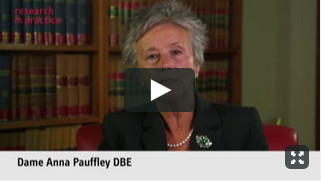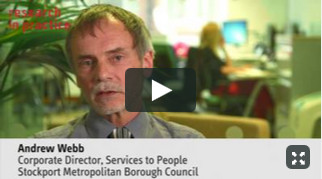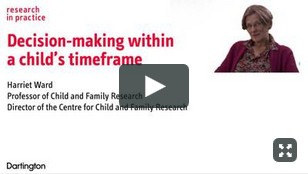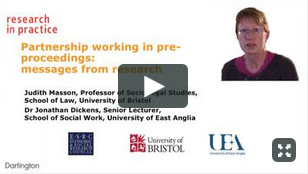Contents
- the drivers for key reforms in the way practioners work in the family court
- video – the Judiciary summarises the reasons for change
- summary of the main implications for practitioners and expectations of practice in terms of assessments, evidence and timescales
- video – DCS explains the importance of effective practice in court
- videos – practitioners talk through local practice examples of how practice in the Family Court has changed and reviewed
- Links to Good Practice Documents
- Messages from research
- videos – researchers summarise key findings of their studies to improve practice
- links to relevant research, reviews and reports on the topic
- e-learning materials for this topic
The need for change
 Introduction to pre proceedings – Mrs Justice Pauffley DBE.
Introduction to pre proceedings – Mrs Justice Pauffley DBE.
Running time: 01:31
Download video direct from Vimeo
Also viewable online via Adobe Connect
(having trouble playing our videos?)
As noted in the Statutory guidance on court orders and pre-proceedings The Children Act 1989 is based on the principle that, where consistent with children’s welfare, local authorities should promote the upbringing of the child
by their families. Where a decision is taken by the local authority that parenting cannot be improved within the child’s timescale and that the ‘threshold’ for care proceedings has been met in principle, it should determine whether to bring proceedings as quickly as possible. Case law has raised important issues for those working in this arena. A joint response to this case law, from ADCS and Cafcass, can be found in their joint letter.
The duration of care proceedings and the impact that this has on children is one of the main concerns regarding the family justice system. There is now a wealth of research which shows that delay in tackling abuse and neglect can have an impact on all aspects of children’s development, including:
- attachment and ability to trust others
- ability to regulate emotions
- education outcomes
- mental and physical health1
- reducing the chances of permanency[2] and increasing the likelihood of experiencing moves within the care system.
The younger that children are when they are placed with permanent carers, the better their outcomes are likely to be3. Children who experience repeated failed attempts at reunification have the worst outcomes.
There are many reasons for delay in care proceedings, but of particular concern are:
- the repeated chances parents are given to make the required changes
- the commissioning of numerous reports
- poor planning
- reactive rather than proactive case management
- thresholds for access to children’s social care being set too high
- over optimistic expectation that children will be able to remain with their birth parents, despite substantial evidence to suggest that this is not possible4.
There is a particular risk of delay in cases of neglect and emotional abuse, where children suffer cumulative harm over time rather than as a result of a specific incident.
The avoidance of delay has to be balanced with the need to make careful decisions within family proceedings, given the lasting and sometimes irreversible implications of these decisions in the lives of children and families. There will be occasions when purposeful delay is justified (for example when a parent is successfully part-way through drug treatment).
References
- Davies and Ward (2012) Safeguarding children across services. London: Department for Education
- Selwyn ET AL (2005) ‘Paved with good intentions: The pathway to adoption and the costs of delay’. British Journal of Social Work 36(4) 561-576
- Davies and Ward (2012) Safeguarding children across services. London: Department for Education
- Davies and Ward (2012) Safeguarding children across services. London: Department for Education
What you need to know
 The importance of effective practice during pre-proceedings – Andrew Webb, Stockport.
The importance of effective practice during pre-proceedings – Andrew Webb, Stockport.
Running time: 02:23
Download video direct from Vimeo
Also viewable online via Adobe Connect
(having trouble playing our videos?)
The reforms to family justice incorporate several changes to practice in court proceedings including:
- an increased emphasis on local authority documentation and assessments being completed earlier during pre-proceedings’ (p.1)5
- an increased emphasis on local authorities providing the court with evidence that is focused, succinct and analytical.
Thus, to meet these requirements, there will need to be timely decision-making, high quality assessments, and well-prepared court applications6.
The Public Law Outline (PLO) is the key guidance the judiciary use for managing public law cases. Revisions to the PLO were made following the care proceeding reforms as a means of streamlining processes to support the 26-week time limit for completing care proceedings, as enshrined in the Children and Families Act 2014.
To meet the 26-week time limit, the revised PLO has a reduced timeframe for key stages in court processes. These are summarised in the PLO flowchart.
The pre-proceedings checklist outlines the Annex Documents that need to be attached to the local authority’s application when issuing proceedings. ADCS and CAFCASS have also produced a series of good practice documents to help practitioners implement the revised PLO.
In these training resources, we refer to pre-proceedings as the process that starts from the local authority issuing the letter before proceedings to parents or carers. In some local authorities this period may also be known as the ‘formal pre-proceedings stage’.
The fact that a local authority has entered into pre-proceedings does not imply that care proceedings will be issued. The pre-proceedings stage provide an opportunity for targeted work with the family that may lead to a case being diverted from court.
References
- Ipsos Mori (2014) Action research to explore the implementation and early impacts of the revised PLO
- Beckett, Dickens and Bailey (2014) Messages from the evaluation of the Tri-borough Care Proceedings Pilot. Centre for Research on Children and Families and University of East Anglia.
Learning resources
Local practice examples
Colleagues from the London Borough of Hammersmith and Fulham Council and Hampshire County Council talk about the changes in practice that took place in their local authority to meet the recommendations of the Family Justice Review, emphasising the pre-proceedings stage.
 Local Practice Examples: Triborough evaluation - Clare Ryan.
Local Practice Examples: Triborough evaluation - Clare Ryan.
Running time: 08:15
Download video direct from Vimeo
Also viewable online via Adobe Connect
(having trouble playing our videos?)
 Local Practice Examples: Hampshire - Steve Crocker.
Local Practice Examples: Hampshire - Steve Crocker.
Running time: 06:10
Download video direct from Vimeo
Also viewable online via Adobe Connect
(having trouble playing our videos?)
ADCS and Cafcass good practice documents
- ADCS and Cafcass good practice documents are a key source of guidance. Documents include:
- Local authority PLO template (unpopulated)
- Cafcass revised PLO guidance
- Revised PLO Cafcass Case Analysis template
- Good Practice Guidance: Applications to Discharge Care Orders
- Draft Good Practice Guidance for Social Work practised in the Family Courts
- Good Practice Guidance: determining whether Cafcass or a local authority should prepare a section 7 report
Practice Direction 12A provides information on the various stages of proceedings and what is required
Cafcass has a number of Resources for judges, magistrates and local authorities, including:
- guidance on the Revised PLO and on using the Cafcass case analysis template
- Cafcass case analysis template
- the template used by Local Authorities making an application for care proceedings
- a completed (hypothetical) application, to be used as guidance for Local Authorities on making an application for care proceedings.
Messages from research
 Decision-making within a child's timeframe - Prof. Harriet Ward.
Decision-making within a child's timeframe - Prof. Harriet Ward.
Running time: 25:05
Download video direct from Vimeo
Also viewable online via Adobe Connect
(having trouble playing our videos?)
Decision-making within a child's timeframe
Harriet Ward, Professor of Child and Family Research, at Loughborough University talks about:
- early child development timescales
- impact of delay on children
- findings from the study Ward ET AL (2012) Safeguarding Babies and very young children from abuse and neglect
- main reasons for delay during care proceedings and pre-proceedings and how to tackle these
- findings from other research on where delays occur and evidence to inform decision making.
 Partnership working in pre-proceedings: messages from research - Prof. Judith Masson and Dr. Jonathan Dickens.
Partnership working in pre-proceedings: messages from research - Prof. Judith Masson and Dr. Jonathan Dickens.
Running time: 12:11
Download video direct from Vimeo
Also viewable online via Adobe Connect
(having trouble playing our videos?)
Best-practice during pre-proceedings and pre-proceedings meetings: messages from research
This film clip provides an accessible and plain language summary of the most relevant research findings from the report: Partnership by Law? The pre-proceedings process for families on the edge of care proceedings.
It provides practical tips on effective pre-proceedings practice, particularly for conducting pre-proceedings meetings and working with families during this crucial stage.
Impact of the Family Justice Reforms on Front-Line Practice Phase One: The Public Law Outline
This report draws on the views and experiences of professionals in six local authorities, focusing on the impact of the family justice reforms and court judgements on local authority practice. It provides evidence on the positive changes that have come about as a result of the reforms, as well as the challenges in implementing the revised PLO.
[_/su_spoiler] [_/su_accordion]Further reading
Links to relevant research, reviews and reports on the topic:
- Brown R and Ward H (2013) Decision making within a child’s timeframe. London: Department for Education
- Beckett C, Dickens J and Bailey S (2014) Messages from the evaluation of the Tri-borough Care Proceedings Pilot. Centre for Research on Children and Families and University of East Anglia
- Bowyer S and Wilkinson J (2015) Impact of the Family Justice Reforms on Front-Line Practice Phase One: The Public Law Outline. Dartington: Research in Practice
- Davies C and Ward H (2012) Safeguarding children across services. London: Department for Education
- FJR (2011) Family Justice Review Final report. London: Ministry of Justice, Department for Education and the Welsh Government
- Giovannini E (2011) Outcomes of Family Justice Children’s Proceedings- a review of the evidence. Ministry of Justice
- Ipsos Mori (2014) Action research to explore the implementation and early impacts of the revised PLO. Ministry of Justice
- Lewis J and Erlen N (2012) Evidence Matters in Family Justice. Dartington: Research in Practice
- Masson JM, Dickens J, Bader KF and Young J (2013) Partnership by Law?: The pre-proceedings process for families on the edge of care proceedings. School of Law, University of Bristol
- View from the President’s Chambers – updates from The President of the family division on the reform of Family Justice
- Ward H, Brown R and Westlake D (2012) Safeguarding Babies and Very Young Children from Abuse and Neglect. London: Jessica Kingsley Publishers
- Wastell D and White S (2012) ‘Blinded by neuroscience: social policy, the family and the infant brain’. Families, Relationships and Societies 1(3) 397-414
Test your knowledge
These exercises aim to help you embed knowledge in this area. A range of different formats have been used, and most can be used individually or in team learning. Discussing your learning with your supervisor will help to ensure it informs your practice
Start test








